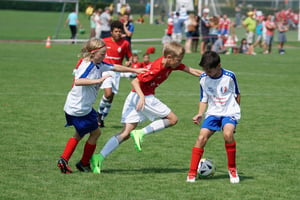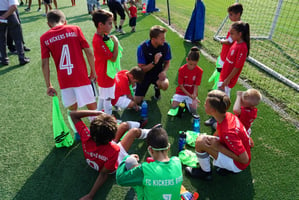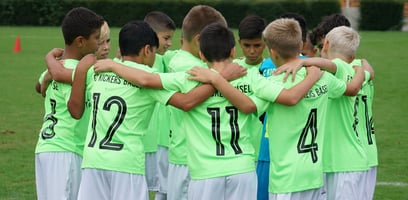Football training with children not only improves technical skills - above all, it is fun and...
Small forms of play: Let children experience the fun of training intensively
We explain how small forms of play can make training fun for children. Find out how you can create a sense of achievement through targeted play and promote enjoyment of sport in the process.
The importance of small sided games in children's football
Small forms of play are of great importance in children's football. They allow the young players to play in small teams and on small pitches - with lots of contact with the ball and a sense of achievement. The playful approach makes training more fun and the children develop a positive attitude towards football. Small-sided games promote the players' technical skills and tactical decisions, as they have to operate in an intensive and dynamic environment. They offer a good opportunity to teach the children the essence of football, as all the game situations of the big game occur in small game forms. Overall, small-sided games help children to enjoy playing football and develop their motivation.
Various forms of play for varied training
There are many different forms of play that can be used for varied training with children. One option, for example, is to play 3-on-3 on 4 mini goals in a small field. Here, the children have many options to develop creatively, experience a wealth of different game situations and improve their technical skills in many actions. Another form of play is 2 against 2 - the smallest and most intensive form of play that still contains all the components of the game of football. In 2 vs. 2, passing, carrying and teamwork are promoted in a highly intensive manner, as there is only one other player who can be involved in the attacking play. The small number of opponents also encourages creative dribbling and the exploitation of counter-attacking situations. A third form of play is 4 against 4 on 2 youth goals with goalkeepers. Small football games on large goals encourage goal kicks and give all children the opportunity to try their hand at goalkeeping. The goalkeepers have lots of action with their hands and feet, can always be played on and open up the game from the back. The variety of game forms keeps the training interesting and motivating for the children.
Creative freedom through targeted, restrained coaching
Targeted, restrained coaching can create space, creativity and a sense of achievement for the children. It is important to support the players individually and give them constructive feedback. Praise the children for their efforts and progress and encourage them to continue to do their best. Give few and clear instructions and occasionally demonstrate techniques to help the children improve. Let the children play freely and try things out for themselves so that they learn to make their own decisions on the pitch. Make room for mistakes and encourage the children to learn from them. A positive coaching environment allows children to build confidence and make bold decisions in training and games.
Promoting teamwork in small teams on small fields
Promoting teamwork is an important aspect of children's football. Small teams on small pitches encourage cooperation between the players. The children learn to communicate with each other, coordinate and act as a team. They also learn to take responsibility and support each other. Due to the limited number of players and the limited space on the pitch, the children have to work closely together in order to be successful. This not only strengthens teamwork skills, but also the children's cohesion and motivation. Encouraging teamwork in small teams on small pitches helps the children to feel part of a unit and to experience successful actions such as scoring, passing and defending intensively together.




